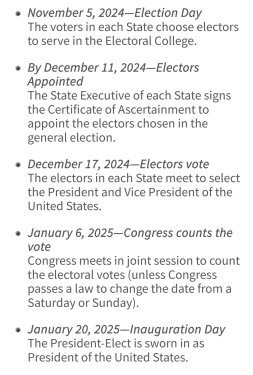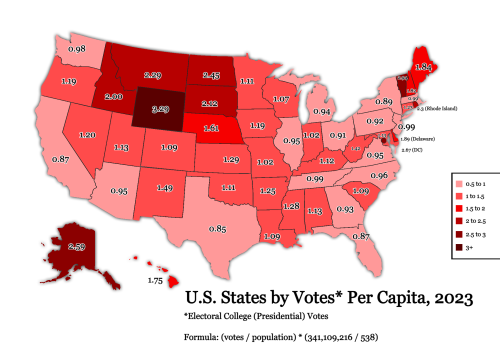-
Posts
862 -
Joined
-
Last visited
Content Type
Profiles
Forums
Events
Everything posted by Matthew
-

Jesus Christ would not vote for Trump
Matthew replied to NAME REMOVED's topic in Federal Politics in the United States
-
When you have tried to change the meaning of "one person one vote," I have used the US Supreme Court to show what it legally means in the US. When you have tried to absurdly claim that the way the US limits it to the states is the true spirit of that doctrine, I have pointed to the fact that it is a universal principle. These points are not contradictory. What? If a Texan's vote is worth 75% less that a North Dakotans vote, how is that proportional? That makes no difference if the electoral college is not proportionally representative in the first place. The end result is that the a minority of the population chose something and the majority was ignored Wishful thinking. You have yet to demonstrate any proportionality in the electoral college. Prove it.
-
I did JUST say that Canada and the UK are two other governments with disproportionality weighted votes. In other words they face similar problems living up to one person one vote major rule. Pretty much every very democracy in Europe uses proportional voting. I notice you just like claim "victory" in a thread day after day rather than actually making any kind of lucid or relevant arguments. Considering we've been talking about this for a week, you've brought literally nothing of consequence to the entire conversation.
-
The Bundestag and provincial Landstag are both highly proportional. Germany's supreme court repeatedly required reforms between 2008 and 2011 to make the electoral system proportional. France has a two different voting systems-- one for president and one for their parliament. The two stage voting system for president is not well liked but none of France's voting problems relate to disproportionate weighting of voters. Canada and the UK do some problems with unequally-weighted non-proportional voting, though nowhere close to the severe disproportionality of the US electoral college.
-
The main issue in terms of critique is not the American voters lack of direct voting for president. The critical flaw is the lack of proportionality. The parliamentary systems you listed perform pretty well in terms of imposing proportionally weighted votes and preserving one person one vote principle. Any system of having fairly elected representatives choose a head of state would be superior and more democratic than having a disproportionate minority-rule system choose a head of state as with the electoral college.
-
Lol it's not a US concept. Those cases were used to show the specific MEANING of that concept within US law in light of your previous efforts to create your own self-serving meaning. But democracy and the various principles like this related to it are used worldwide. Yeah, no shit. I'm mainly just stating general encyclopedic facts about the system in reponse to factual inaccuracies. The electoral votes for president do not proportionally represent Americans. And any representative election system not legally held to a proportionality standard will not have proportionally weighted votes. I said it was "a political principle in any democratic society" which is not to say it is the only principle. Respect for the rights of those in the minority is also a core principle. But there is in fact no democracy without a principle of majority rule. That is the point of voting--to see what the majority of people want. If majority rule was not a core principle of democracy, then we would not associate democracy with voting. Because the electors do not proportionally represent American citizens, the resulting winner of the electoral vote often represents only a minority of American citizens. So it often fails to meet this standard. People are certainly assigned to represent their state as electors, but the distribution of those electors is not proportional. The auto- complete on my phone is just about able to reply to these inane comments without my help. 🙂
-
"One person one vote" is a universal principle by which any electoral system in the world is judged. The electoral college at the national level and within the Constitution makes no pretense of being democratic and clearly fails to meet this principle. Whether the states follow this principle is not relevant since the national vote is not proportional. The context of what you're saying is that the Supreme Court has held the states to this standard but not the electoral college itself. This is because the US Constitution DOES claim that the House votes represent "the people" but no such claim is madein the constitution about the EC. Lol that's cute but "majority rule" is simply a political principle in any democratic society wherein the numerical majority holds the political power to make decisions. "Minority rule" just implies the opposite--an oppressive anti-democratic system where a numerically smaller group hold power over the majority of society. This is what the electoral College does with the presidency. Electors do not accurately represent the people since citizens votes are not proportional.
-

Jesus Christ would not vote for Trump
Matthew replied to NAME REMOVED's topic in Federal Politics in the United States
I find a lot of gender ideas new and old to be ill conceived, but seldom dishonest. But I agree with your logic that the more dishonest a politician is, the less I trust them with government policy making. I'm still a registered republican and I wonder if Republicans will ever return to a situation where they can frame their policy ideas from a place of facts and honesty rather than deliberate disinformation tactics and dishonest sloganeering. -

Harris Rejects Jesus
Matthew replied to gatomontes99's topic in Federal Politics in the United States
Ok, that's fair and well said. Though clearly not obvious because you yourself just earlier today said "nope" to the question of "can someone be a Christian and not be saved?" And I think we know that Christians would have fierce and differing perspectives on this as well. -

Harris Rejects Jesus
Matthew replied to gatomontes99's topic in Federal Politics in the United States
Do you disagree that salvation makes someone a christian and that one can't be a christian without salvation? If you don't disagree with this then doctrines of salvation matter a lot, since there are many, and they differ, and thus there are different ideas about what a christian is (at least as in what makes one). -

Harris Rejects Jesus
Matthew replied to gatomontes99's topic in Federal Politics in the United States
So then the many divergent doctrines about salvation therefore represent differing ideas about what a Christian is. -

Harris Rejects Jesus
Matthew replied to gatomontes99's topic in Federal Politics in the United States
Theologically speaking, can someone be a Christian and not be saved? I was for a few decades, and not casually. -

Harris Rejects Jesus
Matthew replied to gatomontes99's topic in Federal Politics in the United States
Yeah don't you know? Jesus isn't about loving your neighbor and turning the other cheek anymore. Now it's about kicking ass, hating refugees, and owning the libs. -

Harris Rejects Jesus
Matthew replied to gatomontes99's topic in Federal Politics in the United States
Really? Ok, what do Christians widely agree is the way to achieve salvation and thus become a Christian? -
The 538 electors are about 81% based on population. So while that is significant, having it be 18.6% non-proportional is far beyond a reasonable departure from the one person one vote principle and is enough to tilt many elections into rule by a minority. Your claim here is that electors "roughly represent the same number of Americans." The proof for this is not house of representatives reapportionment since the electors are again only 81% based on the House. Instead you have a few relevant choices: 1. State population per elector 2. Citizens of the state per elector 3. Registered voters per elector 4. Actual voter turnout per elector In any of these metrics you will see how much that 19% of Senate- based electors greatly skew the proportionality. It is only the 538 electors who vote for president. The people of the state chose electors. If you're needing help with this point, The US National Archives is the foremost authority on the Electoral College and here is how they outline the presidential election:
-

Harris Rejects Jesus
Matthew replied to gatomontes99's topic in Federal Politics in the United States
Lol, what a weird and implausable flex, bro. While I acknowledge there are some core things that all Christians vaguely share (Nicean creed type stuff), what specifically makes someone a Christian on any degree of greater specificity is not widely shared doctrine between Christian sects. -
See, the fact that you think the states are "being weighted" and that occasionally elected officials "make adjustments" and tinker with "changes to the percentages" shows that you have no idea what the number of electors in each state is based upon. So yes you are free to skip my advised reading adventure and continue to sound like an ignoramus about this topic.
-
Your claim was that "A State gets the number of Electors based on its congressional representation, which is based on its population." So you now understand this is false, correct? 18.6% of the Electoral College is not based on the population of the states. What's your proof of this? I showed you specifically how different they are. A Californians vote for president is about 25% worth the vote of a Wyomingian. Since you're struggling on this point, here are visual aids of the electoral vote per capita: Americans are not the ones voting for president, and the people who are voting in our place do not proportionally represent the American people. It is therefore not a democratic system and it subverts the one person one vote principle.
-
You're taking about being vaguly represented via intermediaries. I'm taking about voters having a direct say, which they do not. Factually untrue. There are only 538 people in the electoral college and their votes do not equally represent the same number of citizens. Yes, nobody wants their vote to count less than someone else's vote. Yeah, but it's not just that California has more people. The electors are disproportionate. A California elector is worth hundreds of thousands of more people than a wyoming elector. Proportional would be all 538 electors represent roughly similar numbers of Americans. Well you seem unaware that seats in half of the US congress are not based on state populations.
-
My point is that the electoral college is not democratic and does not follow the one person one vote principle. The founders wanted the electoral college to carry what they called "a sense" of what the people want. But the people do not directly have a say in a democratic sense. Again these are basic facts of the system and are not controversial. You two are straining to contradict it only to because you need to be stubborn and contrary. I showed you with exact numbers the vastly disproportionate electors between California and Wyoming. How do you explain that? Also this statement i quoted here suggests that you do not know how congressional representation works in the United States. You should go read about that before continuing to sound ignorant on the topic.
-

Harris Rejects Jesus
Matthew replied to gatomontes99's topic in Federal Politics in the United States
oh wow. 🤭







